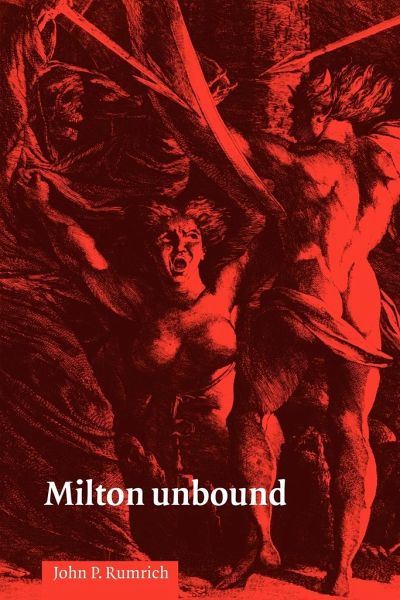
Milton Unbound

PAYBACK Punkte
21 °P sammeln!
Exposes the inadequacy of current critical orthodoxy, and argues that Milton accommodated uncertainty.John Milton - heretic, defender of the Cromwellian regicides, epic poet - holds a crucial strategic position on the intellectual and ideological map of literary studies. In this provocative and liberating study, John P. Rumrich contends that contemporary critics, despite differences in methodology, have contributed to the invention of a monolithic or institutional Milton, as censorious preacher, aggressive misogynist, and champion of the emerging bourgeoisie. Rumrich reveals the pressures that...
Exposes the inadequacy of current critical orthodoxy, and argues that Milton accommodated uncertainty.
John Milton - heretic, defender of the Cromwellian regicides, epic poet - holds a crucial strategic position on the intellectual and ideological map of literary studies. In this provocative and liberating study, John P. Rumrich contends that contemporary critics, despite differences in methodology, have contributed to the invention of a monolithic or institutional Milton, as censorious preacher, aggressive misogynist, and champion of the emerging bourgeoisie. Rumrich reveals the pressures that have shaped this current critical orthodoxy, and exposes the historical inaccuracies and logical inconsistencies that sustain it. Through analysis of Milton's poetry and prose, and consideration of the historical forces that informed Milton's writing, Rumrich argues instead for a more complex Milton who was able to accommodate uncertainty and doubt.
Review quote:
"...consistently engaging. His discussions of Chaos, of the distinctions between human beings and angels, and of the `excessiveness' of Eve are important contributions to Milton scholarship....this book is a book that all Milton scholars will want to read."
Sewanee Review
"In demonstrating the limitations of criticism, the author brings to bear close reading and a startling amount of learning....Rumrich has produced a learned and valuable study of the limitiations of critical analysis."
Choice
"This is one of the most interesting books to have been written on Milton for some time. It is intelligent, perceptive, and thought-provoking. John Rumrich's writing is full of splendid insights..."
The Sixteenth Century Journal
"Rumrich's insights on gender and generation, on maternal influence and indeterminacy in Milton's works are astute and illuminating."
Laura Lunger Knoppers, Clio
Table of contents:
Preface and acknowledgments; Abbreviations and note on translations; 1. Introduction: the invented Milton; 2. The question of context; 3. Responses and their vicissitudes; 4. Comus: a fit of the mother; 5. The art of generation; 6. Culture and anarchy; Notes; Index.
John Milton - heretic, defender of the Cromwellian regicides, epic poet - holds a crucial strategic position on the intellectual and ideological map of literary studies. In this provocative and liberating study, John P. Rumrich contends that contemporary critics, despite differences in methodology, have contributed to the invention of a monolithic or institutional Milton, as censorious preacher, aggressive misogynist, and champion of the emerging bourgeoisie. Rumrich reveals the pressures that have shaped this current critical orthodoxy, and exposes the historical inaccuracies and logical inconsistencies that sustain it. Through analysis of Milton's poetry and prose, and consideration of the historical forces that informed Milton's writing, Rumrich argues instead for a more complex Milton who was able to accommodate uncertainty and doubt.
Review quote:
"...consistently engaging. His discussions of Chaos, of the distinctions between human beings and angels, and of the `excessiveness' of Eve are important contributions to Milton scholarship....this book is a book that all Milton scholars will want to read."
Sewanee Review
"In demonstrating the limitations of criticism, the author brings to bear close reading and a startling amount of learning....Rumrich has produced a learned and valuable study of the limitiations of critical analysis."
Choice
"This is one of the most interesting books to have been written on Milton for some time. It is intelligent, perceptive, and thought-provoking. John Rumrich's writing is full of splendid insights..."
The Sixteenth Century Journal
"Rumrich's insights on gender and generation, on maternal influence and indeterminacy in Milton's works are astute and illuminating."
Laura Lunger Knoppers, Clio
Table of contents:
Preface and acknowledgments; Abbreviations and note on translations; 1. Introduction: the invented Milton; 2. The question of context; 3. Responses and their vicissitudes; 4. Comus: a fit of the mother; 5. The art of generation; 6. Culture and anarchy; Notes; Index.




